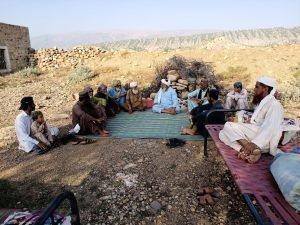
Even though the population of the Tribal area is scattered and a scarcity of pure drinking water and other basic necessities of life the tribes are living happily. During the flood of 2022, the lives of people of tribal areas especially those who are living in valleys and hilltops were affected badly. On our travelling from Dera Ghazi Khan through Barthi, a small hilly station about 44km the west of Tounsa, we tracked to an area called ZAIN, where a massive land sliding as if a mountain had slipped down and filled water channel with mud and made a huge inland dam. I’ll try to mount the pictures of affected sites as well. Barthi is an area inhabited by Buzdar tribe. Under the administration of Usman Buzdar, the ex-chief minister of Punjab the area was like a city having all necessities of life for the people. Usman Buzdar came into power in 2018 and he worked a lot for the development of the area. Now this area has a bridge on its stream Sanghar, one operational hospital, a branch of the Bank of Punjab and a unit of Rescue 1122.
We visited the affectees of the tribal areas. I started my journey on September 7th, 2022 with my two companions: Jallal Nasir Buzdar and Sharif ullah Buzdar a Subedar of FC Baluchistan. These two guys are my friends and their families had settled down in the main city Dera Ghazi Khan about twenty years ago leaving permanently the deprived life of their forefathers in the tribal area. During this catastrophe, all the natives who are dwelling in the south of Barthi faced a lot of difficulties especially in crossing Sanghar stream for getting necessary supplies of food and medicines from Tounsa and Barthi. They have spent nearly forty days in such blockage of the main route. We left our car at the bank of Sanghar stream and two of our relatives of sharif ullah namely Khair ullah Buzdar and Toor Khan Buzdar took us to the main route to Sarbil Ghawash on bikes, from there we’ve walked about 5km to reach the said village.
The Sarbil Ghawash is a Baluchi word meaning valley. So, the area, whose problems I’m intending to pen down is a small village of Shair Muhammad of Sarbil Ghawash UC thekar tehsil Tounsa and about 60 km away from Tounsa city. The terrain of this village is very rough and no other means of transportation at that time was possible than donkeys. During our visit, we explored the houses of the affectees, especially the houses of Mr Asif, Mr Shair Muhammad and Mr Sanjar Khan that was completely destroyed. All of the ruined material in their houses were gathered aside from the places of the houses. There I conducted an interview with Mr Shair Muhammad, the very focal person of Village.
Talha: How many families reside here in this village?
Shair Muhammad: About 12-13 families are currently residing here.
Talha: I’ve seen mostly all the houses had been destroyed completely, now how and where are the families and children residing?
Shair Muhammad: currently some are residing under trees and some of the families are residing in those huts which we usually build for our domestic animals.
Talha: we’ve seen that no means of transportation is possible currently due to collateral damage, so by which mean do you get your supplies and other necessary material like medicines and raw materials for the reconstruction of your houses?
Shair Muhammad: Currently no other means of transportation is possible than donkeys and their drivers used to take nearly 800-900 Rs. as freight charges for carrying one 50kg bag of Cement from Tounsa.
Talha: How much does it cost you to initiate some reconstruction?
Shair Muhammad: it takes about 1.45 Lacs to reconstruct one room house.
These deprived people have spent the severe winter season in such circumstances as no or little help from any government organization or non-government organization has been provided so far. Today, the skyrocketing inflation has increased the suffering of these people many folds.
I often visit the tribal area, but in this season it’s really a saddening trip for me. Next, we moved through damaged roads and to different villages but the village about which I’m going to write further, is Lokh, which is about 6km away from the village of Shair Muhmmad’s Sarbil Ghawash. Here I want to cite an interview conducted with Mr Khair Ullah Buzdar a story of a poor deaf old man who is a badly affected person in the area.

Talha: tell me about this person, who is he and what happened to him?
Khair ullah: His name is Azeem Khan son of Gullay and you know he is a poor deaf old man, one night he was sleeping on his bed in his one-room house when all of sudden the roof had fallen down on him.
Talha: But he is okay now
Khair ullah: yes, Allah almighty has saved his life, and no physical damage happened to his person.
Talha: Currently where and how this poor old man is living?
Khair Ullah: you can see, currently he is living in a specially designed hut, which we usually make for domestic animals.
Talha: what about his family
Khair ullah: he has shifted his all-family members to a nearby secure village.
Talha: What’re his means of income by the way?
Khair ullah: nothing, most of the natives here use to have cattle and crops. All these cattle and crops are dependent on seasonal rain and you know we don’t have lakes of water here. Small rainy ponds full of mud serve as drinking water for humans and animals.
Talha: what’s the cost to rehabilitate the one-room house of this poor old man?
Khair Ullah: the cost of one brick is 14-15 Rs., it costs nearly 2 lacs to construct one because then donkeys no other means of transportation is possible here.
Some of the houses here are near the foot of a high mountain constantly in danger of land sliding and some people have renovated their damaged roofs by themselves but still, they are afraid to live there because some sites are in danger of rocks falling from mountains. An orphan boy named Toor Khan son of Alim khan, took us with him to make his house surveyed.
Toor: we are five brothers and three of them are school-going.
Talha: what about your house, is it damaged during the extensive rainy season?
Toor: Yes, but I’ve renovated my house by borrowing some money and selling some of my goats.
Talha: what’s your source of income?
Toor: we only rely on goats’ milk and nothing else here. Everything is clear to you
Talha: Why you didn’t plough and cultivate some crops? as the land here is very vast.
Toor: No doubt, the lang here is very fertile but the people here are very poor. Some people have solar panel tube wells and some have tractors etc. Only a few people have such things. Only the Sardar or their relatives and friends have some machinery that helps them to plough these lands.
After that, we visited village Ghosaqh, Phoglo, UC thekar. All these areas have only one grocery shop and it lies in Phoglo. This area was affected also by extensive rains. Here, I want to write a story of an old deaf and blind man.
Nasir: he is my uncle, a blind, deaf and poor man. His name is Mian Khan.
Talha: how many children does he have?
Nasir: He has two sons, one used to go to school and the other one used to take care of his father all the time.
Talha: what about his house and family?
Nasir: you’ve seen that his one-room house is completely destroyed and his family is living in a tent on the premises of his brother, Fazal Khan (his house was also damaged and we also visited his house later)
Talha: As his both sons are teenagers and he is nearly 90 years old, what’s the source of his livelihood?
Nasir: some great-hearted souls from this area help Mian khan’s family.
After this visit, we moved through Sanghar to Barthi on bikes. The stories were very painful and heart-aching. It was very difficult for me to control my feelings for these deprived and vulnerable human beings. When I was starting a journey with these Balouch people, I was thinking that how I could visit these scattered villages located in different areas, where no proper transportation is possible, especially during extensive rainy days, but Allah Almighty has helped me out in this regard.
In the last, we visited a village named Noorangani, which is in the vicinity of Barthi, about 2km away from it, there we’ve met a great teacher and preacher, Moulana Munawar, who is providing great service as he left his real home in Tounsa and for teaching students in a madrassah in that deprived area. In Balouchi culture, it’s their custom that they don’t take any guests to their house, but he took us to his completely damaged house. I could not write here my feeling what I felt when I entered his damaged room. Although his house was quite big but almost all the rooms were damaged and Moulana was suffering from a fever, still he gave us a very warm welcome and a great reception which I can’t forget throughout my life. I can’t pen down the feelings after meeting this personality. All the houses we damaged and he was calm but a little bit silent probably due to illness. After offering the Isha prayer, we all slept in the front yard of the masjid and after offering the Fajar prayer we took our car and came back to Dera Ghazi Khan through Barthi, Zain and Tounsa.
In the last, I would like to share that I’ve all the proof of what I’ve gathered there in the form of videos and snapshots. No or very limited help had reached these people either from Govt. or from NGOs. Although, I’ve sought help from some affluent people that was also very limited. I wished at least any great person with a soul may help Mian Khan and Azeem khan in the rehabilitation of their houses. Moreover, my Balouch friends, who helped us to visit these sites and people can also guide and help if anyone intended to go and help them out.

Leave a Reply